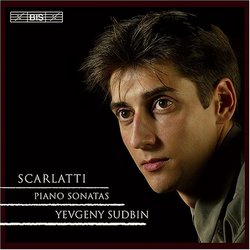| All Artists: Domenico Scarlatti, Yevgeny Sudbin Title: Scarlatti: Piano Sonatas Members Wishing: 1 Total Copies: 0 Label: Bis Release Date: 3/29/2005 Album Type: Import Genres: Special Interest, Classical Styles: Chamber Music, Forms & Genres, Sonatas, Historical Periods, Baroque (c.1600-1750), Classical (c.1770-1830) Number of Discs: 1 SwapaCD Credits: 1 UPCs: 675754818425, 7318590015087 |
Search - Domenico Scarlatti, Yevgeny Sudbin :: Scarlatti: Piano Sonatas
 | Domenico Scarlatti, Yevgeny Sudbin Scarlatti: Piano Sonatas Genres: Special Interest, Classical
|
Larger Image |
CD DetailsSimilarly Requested CDs |
CD ReviewsSudbin's Debut Recording: A Necessary Scarlatti CD J Scott Morrison | Middlebury VT, USA | 01/11/2006 (5 out of 5 stars) "Yevgeny Sudbin was 25 when he made this recording of Scarlatti sonatas. Furthermore, he had not been playing the sonatas for years and years -- which rather surprised me, since his playing is so confident -- but rather had put together this program only after his agent had submitted to the BIS label a compilation disc that included only a couple of Scarlatti's sonatas, and BIS decided they wanted him to record an all-Scarlatti disc. He then systematically read through all 555 of Scarlatti's sonatas (or 'Essercizi,' as the composer called them) and whittled that number down to fifty and then finally the eighteen that are on the CD. To say that these performances are startlingly good is something of an understatement. They are not only good, they are essential to any lover of Scarlatti. Granted, there are those who will only listen to the sonatas as played on a harpsichord and more power to them, but most of us don't mind at all hearing them on the piano and, further, most recordings of the sonatas these days are by pianists. There are some essential pianistic recordings, including Horowitz and Weissenberg (and some would include Pletnev and Babayan) but this disc wins the right to be shelved right up there with the big boys. It is hard to know how to describe why Sudbin's playing is so wonderful, but I'll try. (It's a shame that Amazon has not seen fit to include audio clips from the CD. You'd hear immediately what I'm talking about without having to read my verbiage.) From the very beginning of the first track -- Sonata in B Flat, K. 545 -- you hear that the pianist molds each phrase with extreme musicality, both in phrasing and dynamic variation. This is, of course, done from the perspective of the piano, not the harpsichord; in my opinion, too many pianists try to make the piano sound like a harpsichord, ignoring or trying to hide the essential tonal qualities of the instrument. One might say that Sudbin's approach is Romantic, but that's actually not the case; what it is is unabashedly pianistic, and that suggests gestures that only began in the late 18th century with Mozart and early Beethoven. This is, in my opinion, all to the good. And it also allows Sudbin to tells stories with his playing. By that I mean he can attempt a narrative or limn an emotional tone by variations in touch, legato, dynamics and phrasing, and if that sounds romantic, so be it. What really strikes me is that Sudbin is able to differentiate the individual sonatas so that, unlike so often on the harpsichord, they don't all sound alike. Like many others who have recorded selections from the sonatas, Sudbin has arranged his selection to maximize contrast between consecutive pieces. For instance, Track 1 (K. 545) is a celebration, and the following sonata (K. 466) is reflective, inward, pensive and tender but not melancholy. And so on. He has tended to choose later sonatas but includes one of Scarlatti's rare fugal sonatas (K. 30) and he ends with two other early works, K. 27 and K. 24). Technically, Sudbin's playing is beyond reproach. But equally important is his ability to get to the heart of each sonata and bring out its unique qualities. This all adds up to an amazingly assured, even important, début disc. BIS knows a good thing when they hear it: Sudbin has since recorded a disc of Rachmaninoff for them and word has it that there will be a release the First Concertos of Tchaikovsky and Medtner. Yevgeny Sudbin is definitely a name to remember. It's hard to recall a début disc that made such an impression as this one. Scott Morrison" Beauties Revealed I. Martinez-Ybor | Miami, FL USA | 01/22/2006 (5 out of 5 stars) "On the evidence of this truly masterful Scarlatti CD on BIS, I think Yevgeny Sudbin (25!!!) may be one of the most intelligent, effective, sensitive, commanding pianists around. The beauty of this disc takes one's breath away. Sudbin's approach is totally pianistic, highly lyrical, though totally aware (and effective in the realization) of all the rhythmic intricacies and subtle structural building-blocks which create these carefully wrought gems. Scarlatti's sonatas are short but each is carefully organized. Mr. Sudbin's execution reveals their organization through clearly through phrasing and coloring so that the listener is always fully aware of where things are musically coming from, where they are going, and the varied pleasures of getting there. Thus Mr.Subdin reveals musical structure, evokes all the Spanish folkloric elements in the music, and miraculously have them support the over-arching bel-canto lines which probably more than any other element make Scarlatti so achilingly beautiful over and above the surface brilliance of his technical and rhythmic underpinnings. Listen to K.27 in b minor and you'll be haunted to replay it again and again. By using a pianistic approach, Mr. Subdin does not eschew the martillato effects and rhythmic variety which are so integral a part of Scarlatti. Rather, he uses them not as a means to show off his brilliant technique, but to underscore the musical value of each sonata. He is not bashful to pedal and shift registers, nor to bring the full palette of colors in his technique to fully realize the emotional impact of Scarlatti's music. At all times we are fully aware of listening to beautiful music by Scarlatti first and foremost, not just hearing a virtuoso brilliantly displaying pianistic technique. There is an overwhelming expressiveness and poetry to Sudbin's playing that stands him apart from other luminaries with names far more famous than his. I played his version of K.197 next to Horowitz's on his Sony/CBS recital (the only piece both discs share) and it's amazing how crude, unfeeling, agressive and uninteresting Horowitz came across after hearing Sudbin. This is certainly not meant to denigrate Horowitz's artistry but to highlight Subdin's remarkable achievement, and the differences that mark his performances with what have been "reference" Scarlatti interpretations. Perhaps had Lipatti lived longer maybe he would have given us more cantabile Scarlatti of this sort. Mr. Sudbin's sensitivity and musical intelligence seem to be in the same vein as that of the late great Rumanian interpreter. It is a tribute to Yevgeny Sudbin that he brings to mind such associations. Mr. Sudbin has gorgeous piano tone, all the virtuosity one can desire and the requisite performing humility to never call attention to it but employ it only to serve Scarlatti's music.... a marvel..... I have actually heard the CD three times in a row to ensure I was actually hearing the beauties I heard. One cannot help but wish Mr. Sudbin a brilliant future, praying that he remains loyal to whatever inner fire guided him in this recording. Somehow I can imagine him playing wonderful Schumann... stuff like Kreisleriana.... but I haven't a clue about him other than this disc. My favorite Scarlatti-on-piano discs: Sudbin, Pogorelich, Maria Tipo on Vox and EMI, Horowitz (particularly the little group from the "Horowitz at the Met" album. It takes much more than virtuosity to be a great Scarlatti interpreter. Fast, furious staccato playing just is not enough. The beauties Mr. Subdin reveals show us why. " Finest debut i have ever heard Ryan Morris | Chicago, IL | 12/12/2005 (5 out of 5 stars) "There have been some fine debuts lately of some extraordinary young pianists. the good thing is that there seems to be a trend lately of pianists who are more than merely fingers, but brains and heart. Anti Sirrala's Naxos disc of Schubert Lieder trans, comes to mind(and his ondine debut of Brahms op 5 may be that works definitive recording). Alexandre Tharaud has been around a while, but his recent disc of Bach on Harmonia Mundi was exceptional, and F.F Guy has recorded excellent prokofiev and beethoven. Arcadi Volodos is another great pianist with a tone and virtuosity that may exceed Kissin's. All these pianists share a simialr quality, one that more famous pianists such as lang lang lacks, but tries to force on his audience in live performances with exagerated grimaces and swaying that makes you want to laugh more than anything else. Yundi li may be worth watching, but he needs to be careful to avoid being over exploited and despite what anyone else says, Evgeny Kissin is todays most gifted and promising pianist. And now there is Yvgeny Sudbin. This debut of Scarlatti is hands down the most exceptional debut i have ever heard. The first track is extraordinary in its control, its voicing, and excitement. This is young mans scarlatti, a thinking mans scarlatti, and though all of the previous names could play the notes, I doubt any could play it with such conviction and manical intensity. K 27 is another case in point. It may be one of the greatest tests of any who claim to be great scarlatti players. The notes are simple, but the performer has to decide how sentimental and beautiful they want it to be, most fall somewhere between Gilels extremely slow, though murderously beautiful, version on BBC, or Michelangeli's excersie(it was written as an exercise)like version, which is like a player piano. But Sudbin has his own take on this sonata, making it entirely his own. Niether over sentimentalizing it or making it lose its charm.
He plays all the repeats in all the sonata's, and does an extraordinary job of making it souond fresh and different each time so that casual music fans will be hard up to notice. Follow this man, his career is sure lead him to the mountain top of pianism" |

 Track Listings (18) - Disc #1
Track Listings (18) - Disc #1